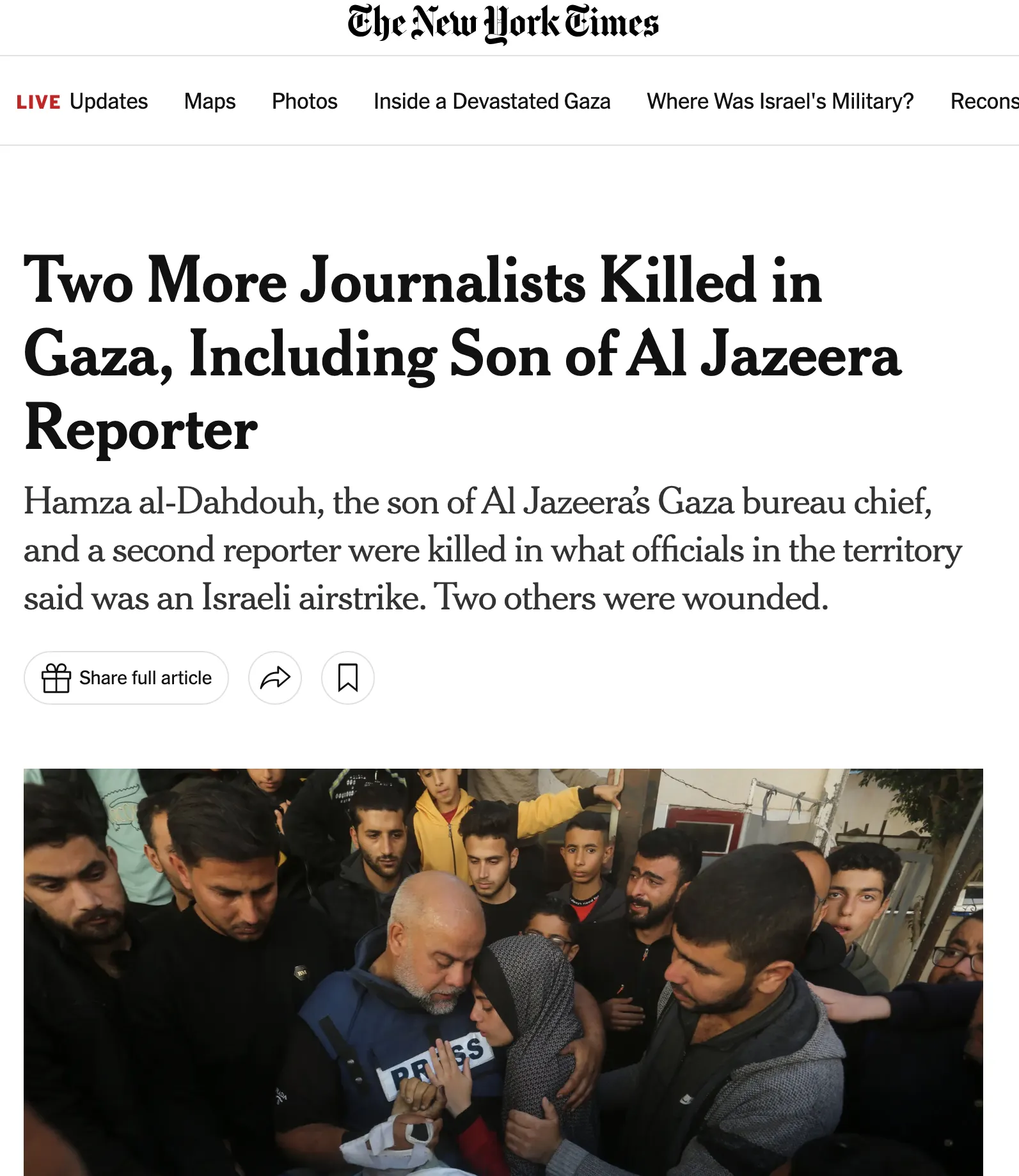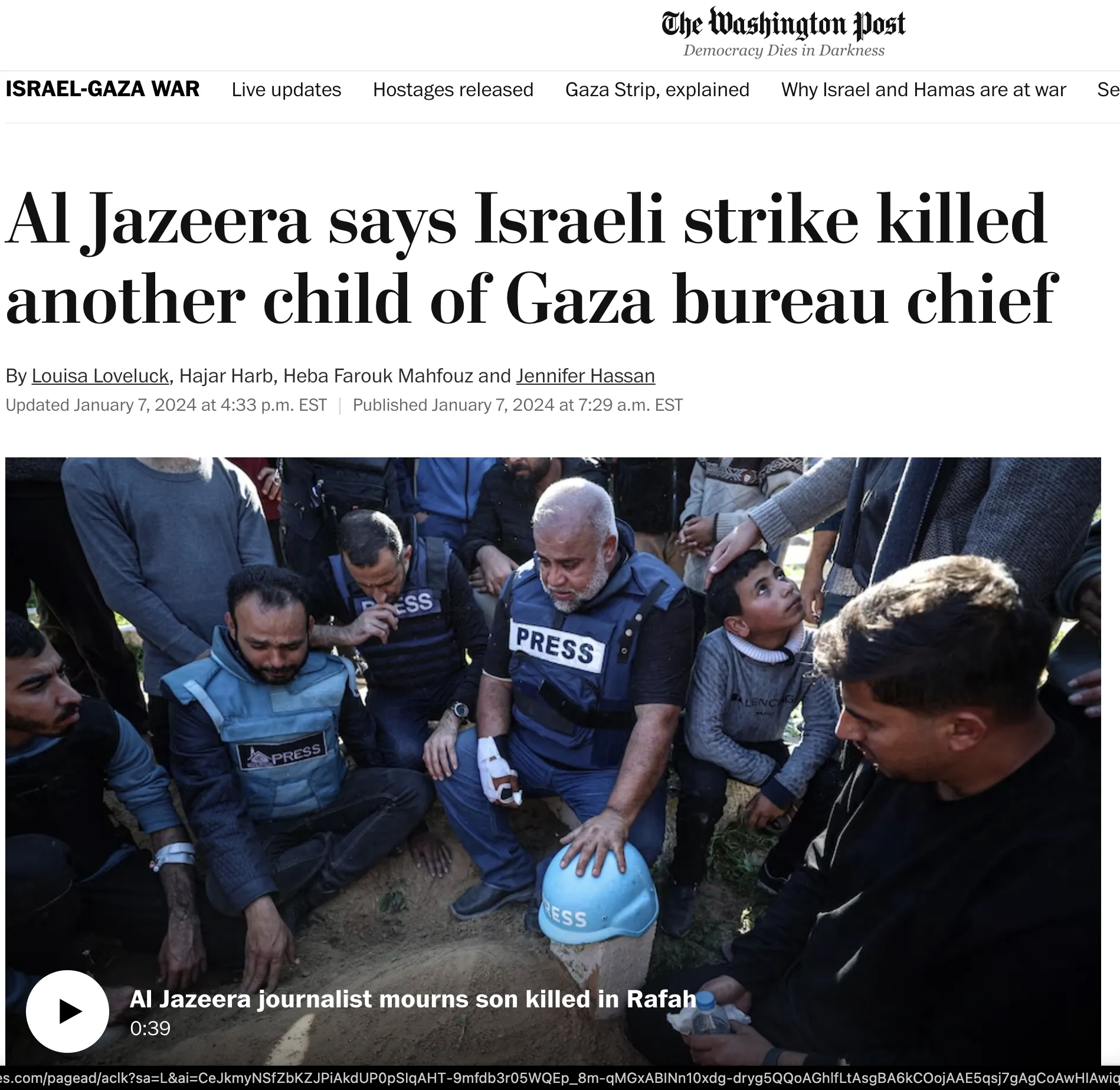Despite evidence, mainstream media outlets appear hesitant to update their stories.
By Rinat Harash, Front Page Magazine
On January 7, media widely reported that Israel had killed two Palestinian “journalists” in Gaza.
The stories about the deaths of Al-Jazeera’s freelancers Hamza Al-Dahdouh and Mustafa Thuraya, who had also been an AFP contributor, were almost identical: All highlighted the fact that the former was the son of Wael Al-Dahdouh, the Qatar-based TV station’s renowned chief correspondent in Gaza.
The stories focused on the personal tragedy of the father, who had lost his immediate family in the war but continued reporting from the field under dangerous conditions.
Media also quoted Al-Jazeera’s condemnation of the deliberate Israeli “targeting” of journalists and mentioned the number of journalists killed so far in the war according to the flawed data of the Committee to Protect Journalists (CPJ).
No media outlet, however, bothered to update or correct their report when on January 10, the Israeli army released evidence proving Al-Dahdouh and Thuraya had been terror operatives.
The IDF says two Al Jazeera journalists targeted in an airstrike on Sunday in southern Gaza's Rafah, were members of terror organizations in the Gaza Strip.
The strike was carried out after the IDF said it spotted a terror operative piloting a drone, and subsequently hit a car… pic.twitter.com/EytbJc6ivV
— Emanuel (Mannie) Fabian (@manniefabian) January 10, 2024
Reuters and AP, for example, which are responsible for providing news updates to thousands of media outlets worldwide, kept their original headlines and stories unchanged:


AP’s report also included an emotional-collegial touch:
Palestinian journalists have played an essential role in reporting on the conflict for local and international media outlets, even as many have lost loved ones and been forced to flee their own homes because of the fighting.
Another wire service, AFP, had no choice but to issue a story about its former freelancer-turned-terrorist after the army’s announcement. But on social media platform X, the agency’s only post on the story still echoes Al-Jazeera:
Al Jazeera says two of its Palestinian journalists in Gaza were killed in a "targeted" Israeli strike.
Hamza Wael Dahdouh and Mustafa Thuria, who also freelanced for AFP, were killed "on their way to carry out their duty" for the channel, it said.https://t.co/NxJc8oNyJn
— AFP News Agency (@AFP) January 7, 2024
Family Tragedy
Other media followed suit.
The New York Times and Washington Post emphasized Al-Dahdouh’s family tragedy.


Both stories still say that the Israeli army did not immediately respond to requests for comment.
And The Washington Post went as far as lamenting the death of someone who had looked up to his father as a journalistic role model.
But it was the news Sunday that his son Hamza al-Dahdouh, the one who had followed in his footsteps and become a journalist, had been killed alongside another colleague, Mustafa Thuraya, that cut the deepest.
Indeed, after the IDF announced that the son had been an Islamic Jihad terrorist, the writers could have discovered that the apple didn’t fall far from the tree, albeit in a different sense: Before he became a journalist, the father had been imprisoned in Israel for terrorist activity. According to an Israeli security source, he was affiliated with Islamic Jihad.
But the Washington Post story, and that of The New York Times, were not updated.
The same applies to CNN, ABC News, BBC, and many others. They echoed the tragic human angle or Al-Jazeera’s claims but failed to update their stories or publish new ones when the new information came to light.
While some outlets did include the immediate army response, saying it had targeted terrorists, it cannot replace a statement issued three days later after a thorough investigation. Especially because these media had also buried it amid articles that led with Al-Dahdouh’s plight.
When the IDF eventually exposed evidence showing Hamza Al-Dahdouh’s name on an Islamic Jihad document, along with specific data identifying the other “journalist” as a Hamas commander, media should have been quick to update their initial reports.
They should have at least published a new, separate story leading with the new information.
But they didn’t.
Why were media so quick to take as gospel the unsupported claims of a Qatari-owned propaganda channel and ignore evidence pointing at their fallacy?
Is it because the evidence serves the “wrong” side in this conflict?
